
What You Need to Know About Nonprofit Audit Requirements in 99 Words
Nonprofit audit requirements can differ depending on your organization’s size, revenue, and funding sources. While some states or grant providers mandate audits once you reach a certain income level, even if it’s not required, having an audit can boost transparency and strengthen donor trust. Maintaining detailed financial records is not just a requirement but a tool that puts you in control of your organization’s financial health and is a crucial step for a smooth audit process, instilling a sense of confidence and control. Partnering with accounting experts specializing in nonprofit needs simplifies meeting these requirements and allows your team to focus more on your mission.
Want more? Keep reading…
Table of Contents
ToggleUnderstanding Nonprofit Audit Requirements
Nonprofit audit requirements can seem overwhelming, but they are crucial in maintaining financial transparency and accountability.
Audits are typically necessary when a nonprofit exceeds a revenue threshold—often around $500,000 annually—or receives funding from government agencies. Even if not required, conducting an audit can be beneficial to demonstrate your organization’s commitment to transparency and financial responsibility.
Staying compliant with audit requirements helps build donor trust and shows your commitment to responsible stewardship of funds. Many grant providers, especially larger institutions, require audited financial statements, making compliance essential for continued funding.
Steps Nonprofits Need to Take to Prepare for an Audit
Preparing for a nonprofit audit involves several vital steps to ensure everything is in order and ready for review.
- Organize Financial Records – Ensure all income, expenses, and donations are accurately recorded and up to date.
- Review Internal Controls – Verify that your nonprofit has strong internal controls to prevent errors or fraud and ensure that they are being followed.
- Compile Necessary Documentation – Gather necessary documents, such as bank statements, grant agreements, payroll records, and tax filings.
- Reconcile Accounts – Ensure all accounts, including bank and credit card statements, are fully reconciled.
- Engage with Your Auditor – Set clear communication with your auditor, providing any requested information beforehand.
- Outsource Accounting Help (if needed) – Consider working with a professional accounting service to streamline the audit process and ensure nothing is overlooked.
How to Simplify Nonprofit Audit Requirements With Accounting Services
Navigating nonprofit audit requirements can be overwhelming, but professional accounting services make the process easier by ensuring compliance at every step.
Staying Compliant With Audit Requirements
Experienced accountants understand the specific regulations nonprofits face and can help ensure you meet all audit requirements. They stay current on state laws and funding guidelines, reducing the risk of non-compliance and penalties and providing security in your financial operations.
Handling Financial Reporting & Tax Filings
Professional accounting services handle your financial reporting and tax filings, ensuring everything is accurate, organized, and ready for audit. They help ensure transparency, which is critical for donor trust and securing future funding.
Reducing Administrative Burden
Outsourcing your accounting needs allows your team to focus on mission-driven work. Accountants take on the time-consuming tasks of maintaining financial records and preparing for audits, relieving your staff from the burden of administrative tasks and allowing them to concentrate on serving your community, thereby reducing stress and enhancing focus.
Final Thoughts
Navigating nonprofit audit requirements can be complex, but it’s crucial for maintaining transparency and donor trust. Different regulations apply based on your organization’s size and funding, and keeping detailed financial records is essential for a smooth audit. Committing to transparency and accountability is key to maintaining trust with your donors and the public. Outsourcing your accounting allows your team to focus more on your mission than getting bogged down by paperwork.
For expert support in managing your nonprofit’s accounting needs, contact Daily Balance today.
Nonprofit Resources

About the Author
Syd Highley is a CPA and Managing Principal of Daily Balance, a nonprofit accounting firm located in Sacramento, CA. Offering virtual nonprofit bookkeeping services that take the place of an in-house accounting department, with the added benefits of financial audit representation and virtual CFO services, Highley empowers nonprofits to focus on their missions while saving up to 40% in accounting costs.






